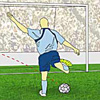
Welcome to the FIFA World Cup!
Finally the wait is over! The first match of the FIFA World Cup 2018 is just about to kick off in Moscow.
With all the emotion and excitement that is to come, we thought that a little football-related maths might come in handy. What could be more relaxing and intellectually stimulating? From making penalties fairer and taking the perfect free kick, to designing an ideal ball and predicting results using an octopus, it's all there in our collection of football articles. Take your pick!
Making penalties fairer
Is the proposed ABBA rule for penalty shootouts really fairer than the existing rule? Maths shows that it is, and also suggests another, more subtle rule.
Making penalties fairer
Is the proposed ABBA rule for penalty shootouts really fairer than the existing rule? Maths shows that it is, and also suggests another, more subtle rule.
Hitting the spot
Where in the goal should you aim a penalty at? A little geometry goes a long way in finding the answer.

How to take the perfect penalty
"It's failure to prepare mentally and failure to take practicing penalties really seriously." This is Plus author Ken Bray's explanation for England's dismal performance in penalty shootouts. Bray, who also wrote the article above, talks some more about penalties in this video.
Blink and you'll miss it: The free kick in football
Free kicks deliver much of the drama in football. But how should strikers approach them and how does the design on the ball impact on its behaviour in flight? Find out more in this article.
When is a goal not a goal?
Remember Frank Lampard's disallowed goal in the 2010 World Cup match against Germany? The ball hit the crossbar, landed well behind the line but then bounced out again. And it all happened too quickly for the ref to spot it was a goal. How these kind of (non)-goals happen and what can we do about them?
A fly walks around a football
What makes a perfect football? It must be round, retain its shape, be bouncy but not too lively and, most importantly, be capable of impressive speeds. We find out that this last point is all down to the ball's surface, the most prized research goal in ball design.
If you can't bend it, model it
Learn about the aerodynamics of footballs and perfect your free kick.
Clocking the schedule
The way many football leagues schedule their fixtures can lead to unfair effects — and unsolved maths problems! Dries Goossens, who schedules the Belgian Pro League, explains.
How psychic was Paul?
England's performance in the 2010 World Cup was thankfully overshadowed by the attention given to Paul the octopus, who was reported as making an unbroken series of correct predictions of match winners. But how psychic was Paul, really?